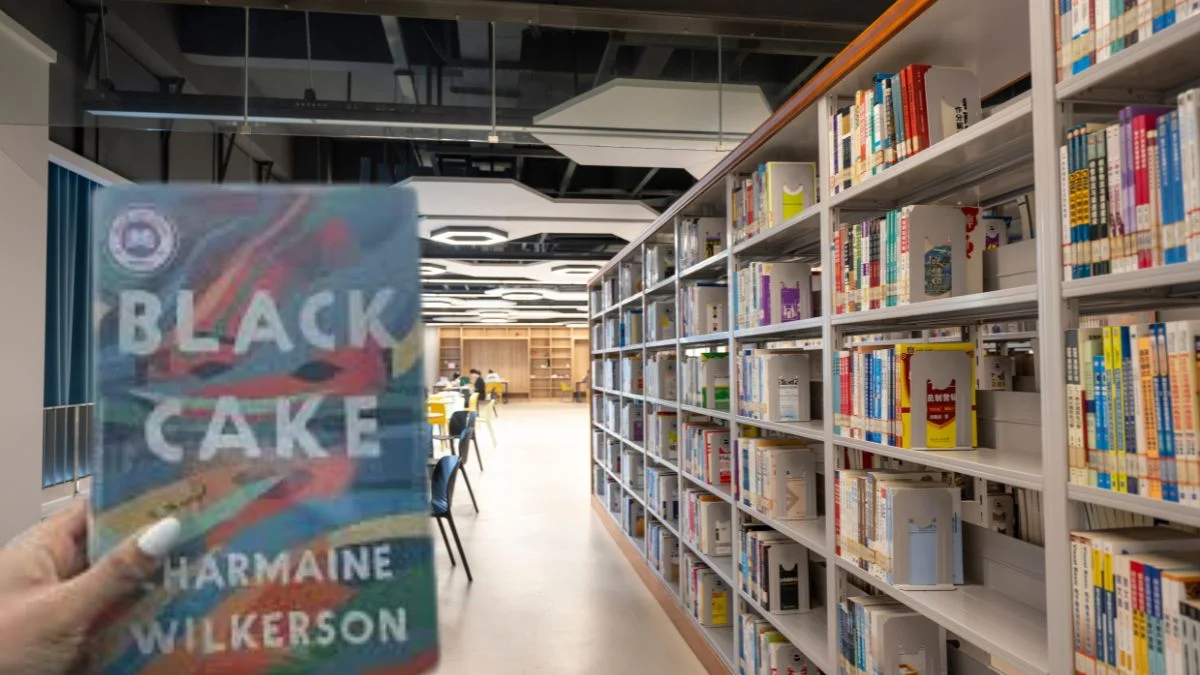“Black Cake” by Charmaine Wilkerson is a captivating debut novel that explores the complex dynamics of family, identity, and the intergenerational effects of secrets and unresolved issues. The narrative is framed around the lives of two estranged siblings, Byron and Benny, who are brought together after their mother’s death. As they sit to listen to her last words, delivered through a recorded message, they learn about a secret past that challenges everything they thought they knew about her and their family. Central to the story is a black cake, a traditional Caribbean dessert, which becomes a symbol of survival, resilience, and the intricate layers of the family’s heritage.
Wilkerson’s novel is a multilayered tale that deftly weaves together themes of migration, race, love, and the endurance of cultural traditions. Through its compelling narrative and richly drawn characters, Black Cake takes readers on a journey that spans generations and continents, from the Caribbean to the UK, and from the US to Africa.
Black Cake: A Story Rooted in Tradition and Secrets
The title of the novel, Black Cake, refers to a dense, rich fruit cake often made in the Caribbean during celebrations like weddings and Christmas. It is symbolic in the novel, representing not only the layers of family history and the weight of secrets but also the persistence of cultural traditions across generations.
After their mother, Eleanor Bennett, dies, siblings Byron and Benny come together for the first time in years. Benny, who had been estranged from the family due to misunderstandings and differences, returns home for her mother’s funeral. Byron, a successful oceanographer, has his own set of unresolved issues. As they reunite, they find themselves grappling with a new inheritance: a voice recording left by their mother and a black cake.
The recorded message leads the siblings on a journey of discovery, forcing them to confront their mother’s hidden past and the secrets she had kept from them. Through this journey, the siblings come to learn about their mother’s true identity, her struggles, and the sacrifices she made for her children.
Black Cake Book Characters
One of the strengths of Black Cake is the complexity of its characters, each of whom brings a unique perspective to the narrative. At the center of the story are the Bennett siblings:
- Byron Bennett: A renowned oceanographer, Byron is the more conventional of the two siblings. He is deeply invested in his career and takes pride in his accomplishments. However, his personal life is less stable, and his relationship with Benny is strained due to their differing worldviews and the unresolved family tensions.
- Benny Bennett: Benny is a creative and free-spirited woman who has long felt like an outsider in her own family. She has struggled to find her place in the world, and her estrangement from her family has left her with feelings of abandonment and betrayal. Through the course of the novel, Benny’s journey of self-discovery mirrors her exploration of her mother’s hidden past.
- Eleanor Bennett: The late mother of Byron and Benny, Eleanor is a complex figure whose life was shaped by migration, love, loss, and survival. The narrative of her past life, revealed through her recorded message, forms the backbone of the novel’s plot.
Other significant characters include Eleanor’s childhood friend, her lover, and various people who played key roles in her secret past. These characters add depth and nuance to the novel, making it not just a family drama but also a story about the larger forces of history, culture, and identity that shape individuals’ lives.
Black Cake Book Summary
The novel begins with the death of Eleanor Bennett, who leaves behind a black cake and a message for her children. The cake, a family recipe passed down through generations, is more than just a dessert; it symbolizes the family’s heritage and the unspoken stories that have shaped their lives.
Through the recorded message, Eleanor reveals a part of her life that her children never knew existed. Born in the Caribbean, Eleanor lived a life of hardship and secrecy before moving to the UK and later to California. She was forced to leave behind her first identity, Covey, and take on a new name after a tragic event that altered the course of her life.
As the siblings listen to their mother’s revelations, they learn about the life she led before she became the woman they knew. This life included a forced marriage, a secret child, and a daring escape from her homeland. Eleanor’s story is one of resilience and survival, but it is also one of sacrifice and loss. The novel moves back and forth in time, weaving together Eleanor’s past with Byron and Benny’s present as they grapple with the weight of these revelations.
The black cake becomes a metaphor for the many layers of Eleanor’s life and the hidden ingredients that went into shaping her children’s identities. As Byron and Benny come to terms with their mother’s past, they also begin to reconcile their own differences and find a renewed sense of connection with each other and their shared heritage.

Themes in Black Cake
Black Cake Book tackles several important themes, making it a profound and thought-provoking read. Some of the key themes include:
- Family and Estrangement: The novel explores the impact of estrangement on families, particularly the relationship between Byron and Benny. Their journey toward reconciliation mirrors the unraveling of their mother’s secrets and the realization that they are more connected than they thought.
- Identity and Belonging: Both Byron and Benny struggle with their sense of identity, shaped by their mother’s hidden past and the cultural heritage that was never fully shared with them. The novel raises questions about what it means to belong, especially in the context of migration and the diaspora experience.
- Migration and Displacement: Eleanor’s life is marked by displacement, from her forced departure from the Caribbean to her migration to the UK and then to California. The novel explores the emotional and psychological toll of migration, as well as the resilience required to build a new life in a foreign land.
- Secrets and Truths: The novel is built around the idea of hidden truths and family secrets. Eleanor’s decision to reveal her past to her children only after her death speaks to the weight of these secrets and the ways in which they shape family dynamics.
Black Cake Book Review
Black Cake Book has been widely praised for its beautifully crafted narrative and its exploration of complex themes. Charmaine Wilkerson’s writing is both lyrical and poignant, and she masterfully weaves together multiple timelines and perspectives to create a rich and immersive story.
Critics have noted the novel’s deep emotional resonance, as well as its ability to tackle difficult topics such as race, gender, and migration with sensitivity and nuance. The characters are fully realized, with their flaws and vulnerabilities making them all the more relatable.
One of the standout features of the novel is its use of food as a metaphor for culture, memory, and survival. The black cake itself becomes a symbol of the family’s history, with its many ingredients representing the diverse influences that have shaped their identities.
While some readers may find the novel’s structure challenging, with its frequent shifts in time and perspective, many have praised this narrative technique for adding depth and complexity to the story. Overall, Black Cake is a powerful and moving novel that offers a poignant meditation on family, identity, and the enduring impact of the past on the present.
Conclusion: Black Cake Book
Charmaine Wilkerson’s Black Cake Book is a beautifully written novel that explores the intricacies of family relationships, the hidden layers of identity, and the enduring legacy of cultural traditions. Through the story of Eleanor Bennett and her children, Byron and Benny, the novel delves into the complex web of secrets and truths that shape our understanding of ourselves and our families. The black cake at the center of the story serves as a powerful symbol of survival, love, and the many ingredients that make up a family’s history. Black Cake is a must-read for anyone interested in stories about the human experience, cultural heritage, and the ways in which the past continues to influence the present.
FAQs About Black Cake Book
What is the black cake in the novel?
The black cake in Black Cake is a traditional Caribbean dessert that symbolizes the layers of family history, culture, and secrets. It represents survival and resilience in the face of adversity.
Is there a Black Cake Season 2 of the miniseries adaptation?
As of now, there is no official confirmation regarding a second season of the Black Cake miniseries. However, fans of the book and show are hopeful for a continuation.
What are the key themes in Black Cake?
Some of the key themes include family and estrangement, identity and belonging, migration and displacement, and the impact of secrets and hidden truths on family dynamics.
Who are the main characters in Black Cake?
The main characters include Byron and Benny Bennett, siblings who come together after their mother’s death, and their mother, Eleanor Bennett, whose past forms the crux of the story.
What is the significance of the black cake in the book?
The black cake represents the family’s cultural heritage and the hidden ingredients (secrets) that shaped their identities. It also symbolizes Eleanor’s resilience and the survival of her legacy.
How has Black Cake been received by readers?
Black Cake has been praised for its emotional depth, complex characters, and exploration of themes like race, migration, and family dynamics. It has received positive reviews for its storytelling and Wilkerson’s lyrical writing style.









